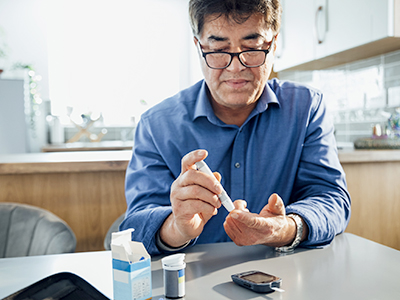
Our expert delves into the technological and biological innovations that are transforming management.
Approximately 300,000 Canadians live with type 1 diabetes, an autoimmune disorder with no known cure. Type 1 diabetes can pose serious challenges, but ongoing research is improving the quality of life for those with this chronic condition. Endocrinologist Dr. Breay Paty discusses the effects of low and high blood sugar, as well as science-backed management strategies and emerging biological treatments for type 1 diabetes.
Q: What is the difference between type 1 diabetes and type 2 diabetes?
A: Diabetes occurs when blood sugar levels remain elevated over time. The two most common forms are type 1 and type 2 diabetes.
Type 1 diabetes (T1D) accounts for five to 10 per cent of cases. It is an autoimmune condition, usually diagnosed in children and young adults, although it can appear at any age. T1D causes the pancreas to lose the ability to produce insulin, requiring insulin therapy through injections or an insulin pump.
Type 2 diabetes (T2D) makes up 90 to 95 per cent of cases. It is a metabolic condition typically occurring in middle-aged and older adults and is often associated with conditions like obesity, high blood pressure and high cholesterol, which increase the risk of heart disease and stroke.
Q: Is T1D hereditary? Can I pass it on to my children?
A: T1D is not strictly hereditary, as it is not caused by a single gene, but it does have a genetic component. Most people with T1D do not have a family history of the disease, but often have a family history of other autoimmune conditions, such as asthma, eczema, vitiligo or psoriasis.
The likelihood of passing on T1D to children depends on various factors, including genetic markers. Generally, if the mother has T1D, the risk of her child developing T1D is two to four per cent; if the father has T1D, the risk is six to eight per cent; and if both parents have T1D, the risk is 10 to 25 per cent.
Q: What are hyperglycemia and hypoglycemia, and how do they affect people with T1D?
A: Hyperglycemia is also known as high blood sugar. When blood sugar is highly elevated, symptoms can include fatigue, weakness, blurred vision, increased thirst and urination, and low blood pressure. Serious cases can lead to metabolic decompensation or diabetic ketoacidosis — dangerous conditions that require immediate emergency care. Over time, hyperglycemia can damage blood vessels, eyes, kidneys and nerves.
Hypoglycemia, or low blood sugar, can cause weakness, sweating, shakiness and hunger. Without treatment, these early symptoms can escalate to blurred vision, irritability, confusion and even unconsciousness, seizures or comas. People who experience repeated episodes of low blood sugar may experience “hypoglycemia unawareness”, which puts them at higher risk of complications.
Q: How can I better manage my blood sugar levels?
A: For people with T1D, keeping blood sugar levels within the recommended ranges is key to avoiding complications:
- Pre-meal blood glucose: 4-7 mmol/L
- Two-hours after-meal: 5-10 mmol/L

Q: Why do people with T1D need to take insulin? Can diet and exercise help?
A: People with T1D need to take insulin because their pancreas cannot produce it, making it impossible to regulate glucose or convert it into energy for the body. Without insulin, high blood sugar can quickly become life-threatening.
In contrast, most people with T2D still produce insulin, though not enough to keep their blood glucose in the recommended range. As a result, many can manage their blood sugar through lifestyle changes like diet, exercise and weight loss, often with oral medications. However, even some people with T2D may eventually need to take insulin.
Q: How is research improving the quality of life for people living with T1D?
A: Over the past 20 years, tremendous progress has been made in the management of T1D. Innovative devices like continuous glucose monitors and insulin pumps allow individuals to monitor their glucose levels and manage their insulin more effectively.
Emerging biological treatments, such as pancreas and islet cell transplants, offer the potential to restore insulin secretion. Clinical studies at Vancouver General Hospital are also exploring the use of insulin-producing stem cells. Currently, these treatments require immunosuppression medication which reduces the body’s ability to fight infection, but research may one day eliminate this need, making such therapies safer and more accessible.



